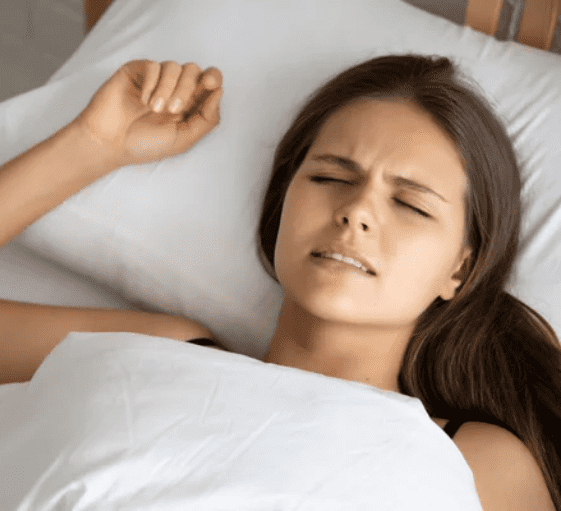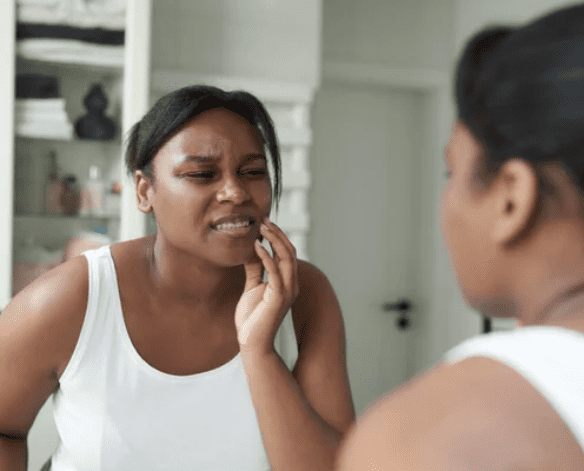What Are the Common Symptoms of Bruxism?
What is Bruxism?
Types of Bruxism

Daytime Bruxism
Sleep Bruxism
How is Bruxism Diagnosed?
One of the most common ways bruxism is found is when your sleep partner hears you chewing and grinding your teeth at night. When kids clench their teeth at night after going to bed, this is also how their parents find out they have bruxism.
During a regular dental checkup, your dentist will look at your teeth, in general, to see if there are any signs of bruxism, such as teeth that are worn down too much or have flattened tips. If there are signs and symptoms, they will keep an eye on the situation at the next appointment before starting treatment.
A dentist will look at your bite records and compare them to those from your last visit. He or she will also keep an eye on your teeth for signs of abnormal tooth wear or even tooth loss. They may also help you fill out the Bruxism Status Questionnaire (BSQ), which is their own test, or order overnight polysomnography (PSG) to find out how bad the bruxism is and measure it accurately.
If you suddenly have a sore jaw, sensitive teeth, headaches, or even trouble sleeping, you should talk to a doctor right away about bruxism so they can start an effective treatment.
Symptoms of Bruxism
Although some people with mild bruxism may not experience any noticeable or immediate symptoms, the condition can still cause serious dental problems over time.
Symptoms of bruxism may include:
Teeth grinding or clenching that is loud enough to wake up a partner or cause jaw pain
This grinding sound often occurs during sleep and can be disruptive not only for the person experiencing bruxism but also for their bed partner. The grinding noise is typically caused by the friction between the upper and lower teeth as they forcefully rub against each other.
Loose teeth or worn, chipped, flattened
One common symptom is loose teeth or teeth that feel unstable. The repetitive and excessive force applied to the teeth during bruxism can loosen them from their sockets over time. This can be a cause for concern as loose teeth can lead to tooth loss if not addressed promptly. The intense pressure exerted on the teeth can cause them to chip or break, especially if pre-existing weak spots or dental restorations such as fillings or crowns exist.
Tooth sensitivity or tooth pain
Bruxism can cause the protective layer of the teeth, called enamel, to wear down. When the enamel becomes thin or eroded, the underlying layer of dentin, which contains microscopic tubules that connect to the nerves, may become exposed. As a result, stimuli such as hot or cold temperatures, sweet or acidic foods, or even air can trigger tooth sensitivity and cause pain or discomfort.
Headaches, particularly in the temples or in a hatband shape around the head.
Bruxism-related headaches often manifest as a dull, persistent pain that radiates from the temples. The discomfort may also extend to the forehead and the back of the head or create a sensation of pressure around the head, resembling a hatband. These headaches can be intermittent or chronic, occurring during or after teeth-grinding or clenching episodes.
Jaw pain, stiffness, or discomfort

Earache or pain that resembles an ear infection
Individuals with bruxism often experience earache or pain that resembles an ear infection. This symptom can be quite distressing, as it can mimic the discomfort associated with an actual ear infection, leading to confusion about the underlying cause. Consulting with a healthcare professional or an ear specialist (otolaryngologist) can help determine the precise cause of the earache and ensure appropriate treatment.
Disrupted sleep or insomnia
Bruxism-related sleep disturbances can manifest in different ways. Some individuals may find it challenging to initiate sleep due to the discomfort or noise caused by teeth grinding. The grinding sound can be loud enough to awaken the person or their sleep partner, disrupting the sleep cycle.
Moreover, the muscular activity involved in bruxism can cause frequent awakenings during the night. The grinding and clenching motions can activate the muscles and the nervous system, leading to sleep fragmentation. As a result, individuals with bruxism may experience multiple awakenings throughout the night, reducing the overall sleep duration and impairing the restorative quality of sleep.
Neck or facial pain
Bruxism can cause tension and tightness in the muscles of the jaw, face, and neck. The constant grinding and clenching motions can overwork these muscles, leading to muscle fatigue, soreness, and pain. This pain may be localized in specific areas, such as the jaw joints (temporomandibular joints or TMJs), temples, cheeks, or along the sides and back of the neck.
Treatments for Bruxism
Don’t let your teeth grinding, clenching, and other symptoms of bruxism go untreated. Even mild bruxism can negatively impact your health in the long run, so it is important to address it. The right treatment can reduce pain and damage and improve your overall health and well-being.
Here are some of the most common bruxism treatments, and remember to always consult first with a healthcare professional for a proper diagnosis and appropriate treatment plan.
- Mouth Guards – Oral appliances are used to keep teeth apart in order to prevent damage from clenching and grinding.
- Muscle Relaxants – In some circumstances, your doctor might advise using a muscle relaxant for a little time before bed.
- Stress Management – You can relax and lower your risk of bruxism by doing things like listening to music, taking a warm bath, or engaging in physical activity.
- Improve sleep – Getting a full night’s rest, which may involve seeking therapy for sleep issues, has been shown to have a positive effect on bruxism.
- Dental Adjustments – Your dentist might need to modify the chewing surfaces or use crowns for your teeth to correct the damage in severe situations where tooth wear has resulted in discomfort or the inability to chew effectively.

Don't Ignore Bruxism Symptoms
FAQ
When Should You See a Doctor about Bruxism?
Who is at Risk for Bruxism?
The risk factor of bruxism may be increased by using recreational drugs, drinking alcohol or caffeine-containing beverages, smoking cigarettes, or genetic factors. Also, people that have a family clinical history with a tendency to bruxism are at risk.
Can bruxism be a result of stress or anxiety?
Yes, stress and anxiety can be contributing factors to bruxism. Emotional stress, anxiety, or tension can lead to increased muscle activity, including grinding and clenching of the teeth. Bruxism can serve as a subconscious response to stress, and managing stress through relaxation techniques or seeking appropriate support may help reduce bruxism episodes.

